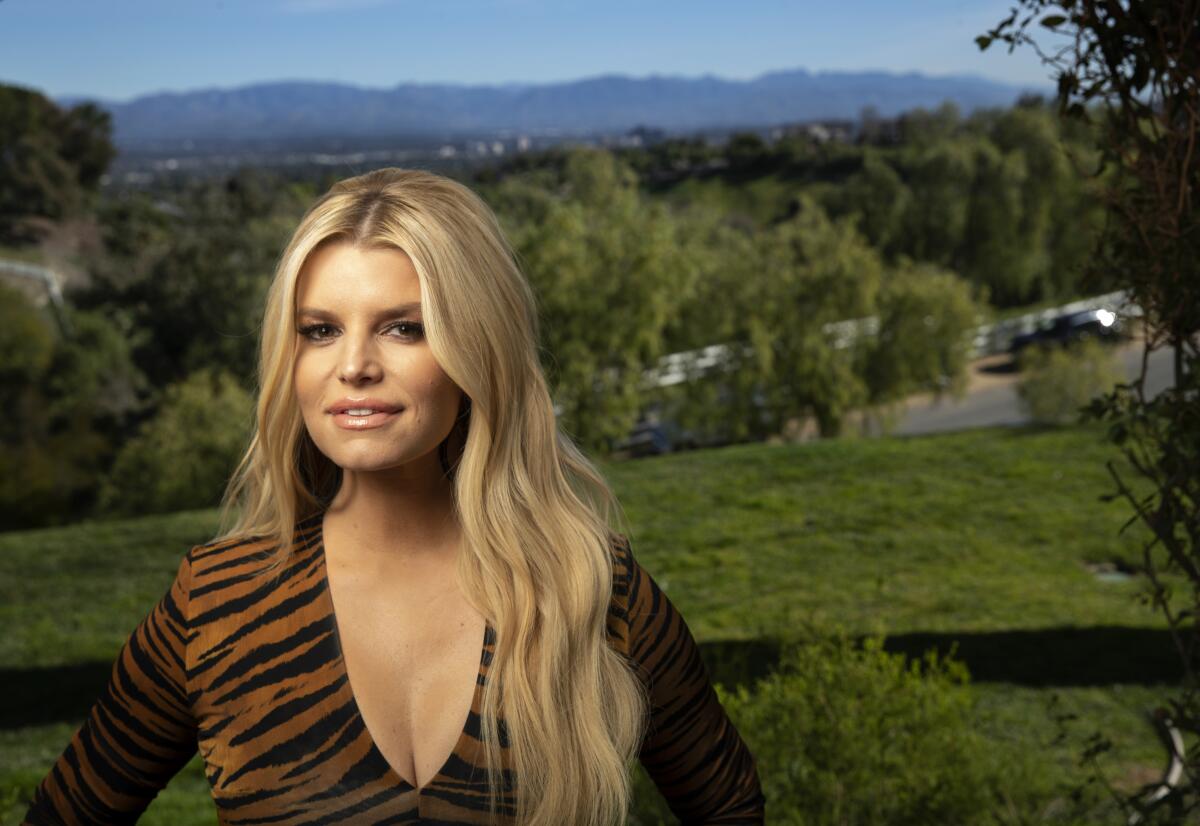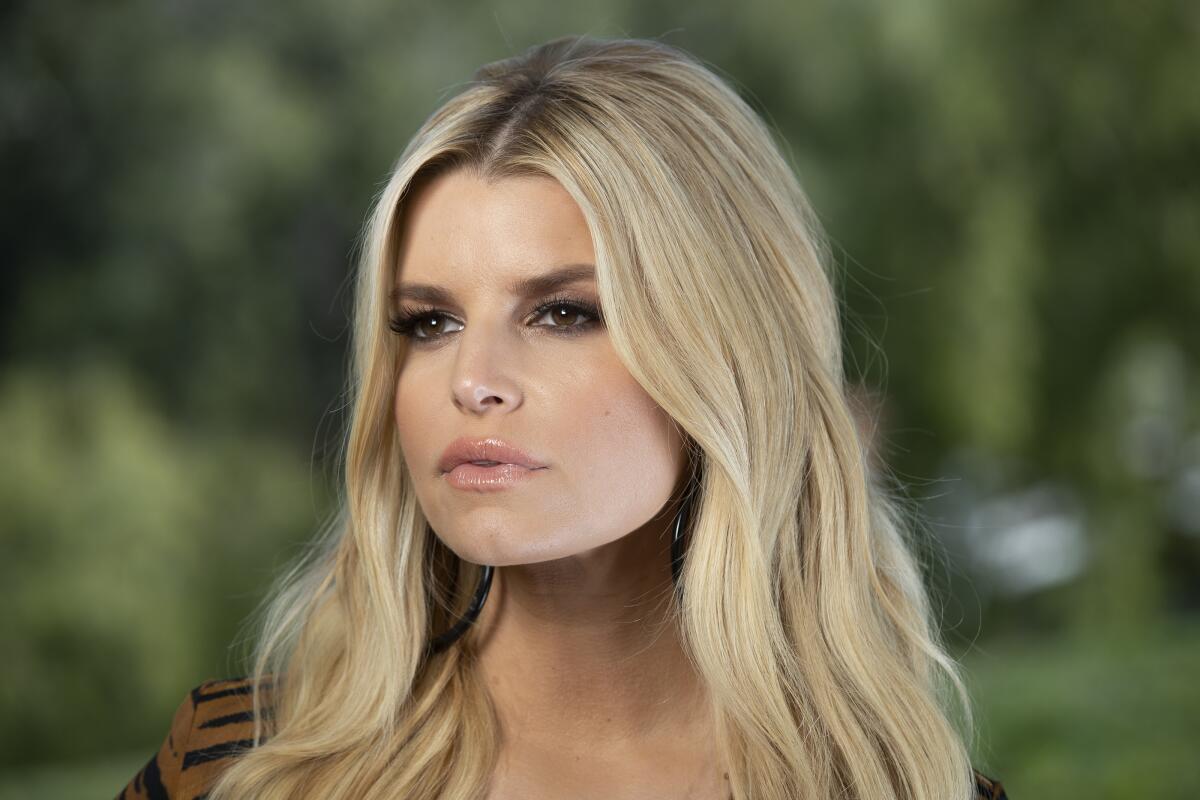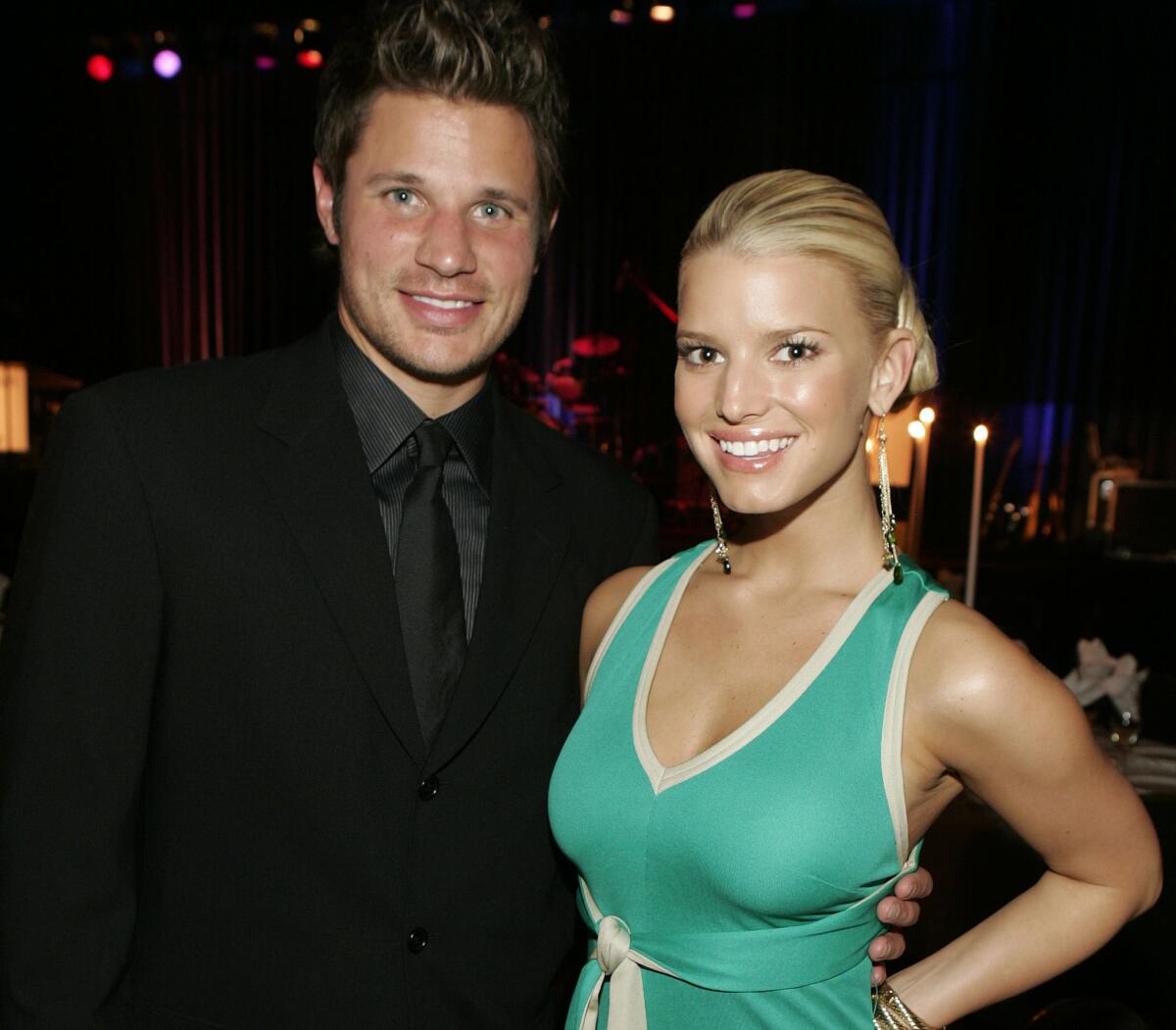Jessica Simpson’s blond bombshell: a memoir that spares no one, including herself

- Share via
Jessica Simpson wants to meet in the room where she spent many insomnia-filled nights penning her memoir: her library. It’s true: Jessica Simpson, the once-pop princess and reality TV star, has evolved into Jessica Simpson, the serious writer. On the first floor of her sprawling Hidden Hills mansion is Simpson’s personal study: four walls of literature nestled in cherry wood shelving. Buried within her floor-to-ceiling collection are books on photography and art, her childhood Bible and her favorite novel, Charles Dickens’ “Great Expectations.” But there’s only one book that’s holding her attention at the moment: her own, “Open Book.”
For the last decade, Simpson, 39, has remained largely silent, following a tabloid-fodder career as a budding teen-pop singer, MTV starlet and celebrity dater. Aside from starring in a VH1 documentary series, “The Price of Beauty,” a worrisome appearance on “Ellen” (she now admits she was drunk) and some playful social media posts including one about her swollen ankles during her pregnancy, the singer has been focusing on her billion-dollar namesake lifestyle and clothing line, getting remarried and raising three children, Maxwell Drew, 7, Birdie Mae, 11 months, and Ace Knute, 6.
But with the 400-page “Open Book,” Simpson breaks open the dam that is her personal history and the gossip surrounding her life, from the sexual abuse she experienced as a child to her alcohol addiction.
“I’m not perfect,” she says, cross-legged on a blue velvet couch, an approachable Barbie with a face full of bronzer, a fresh blowout of tousled curls and navy-and-gray-striped sweatpants. “And I don’t hold myself to that standard anymore.”

Born in Texas to psychologist and preacher father Joe and homemaker mother Tina, she grew up moving around the state with her parents and her sister Ashlee. During her adolescence, she auditioned for “The Mickey Mouse Club” alongside Britney Spears, Christina Aguilera, Justin Timberlake and Ryan Gosling. While she didn’t make the cut — Spears and Aguilera did — her powerful voice eventually helped her land a record deal with Columbia in 1998, with Joe as her manager.
She and the label thought her ballad “I Wanna Love You Forever” would set her apart. But Spears’ “... Baby One More Time” and Aguilera’s “Genie in a Bottle” transformed the sound and sexual presentation of pop music for young female artists. “That’s when the crop-tops came in and the dancing and choreography, and that was all confusing for me,” she says. Label head Tommy Mottola ordered her to lose 15 pounds. Simpson applied eyeshadow to her stomach to provide the illusion of abs. “I had so many people pushing me to surpass these crazy numbers of records that these girls were selling and I just didn’t know how to do it,” she recalls.
It was reality TV, and not “TRL,” that finally created an identity for Simpson. In 2003, she and new husband Nick Lachey, singer in the hunky boy-band 98 Degrees, allowed cameras into their McMansion for MTV’s “Newlyweds.” There, Simpson infamously wondered whether a can of Chicken of the Sea contained chicken or tuna, and if Buffalo wings were indeed made of buffalo.
“Jessica really is that simple and innocent. That’s why she’s so endearing,” says Teresa LaBarbera Whites, the Columbia A&R executive who helped sign Simpson.

Following in the dog-poop-encrusted footsteps of Ozzy Osbourne, Simpson became the new face of MTV, a stereotypical “dumb blond” who seemed to play the role to the hilt. But “Newlyweds” didn’t make things easy for her and Lachey. When they first started dating, she was opening for 98 Degrees. But when “Newlyweds” became a hit, Rolling Stone magazine decided they wanted only Simpson for their cover. “It ends up being a competitive thing even if you don’t want it to be,” she says. The two divorced in 2006.
Aside from her father and her husband, former NFL tight end Eric Johnson, the men in Simpson’s life don’t fare too well in “Open Book.” Singer/guitarist John Mayer, with whom Simpson had a tumultuous on-and-off-and-on-again relationship, comes across as particularly manipulative. After a breakup, she writes, Mayer would re-enter her life just as she had moved on, or show up unexpectedly in places he knew she would be, professing to need her for the sake of his art. “I ended up feeling like I was just some muse,” says Simpson, calling it “creepy.” During their time together, Simpson also drank a lot — his intelligence was both swoon-worthy and intimidating to her. “He was somebody I couldn’t shake. I was addicted to our love. Two years ago my therapist told me loud and clear: ‘He never loved you,’” Simpson says.
One of the most powerful through-lines in “Open Book” is Simpson’s years-long struggles with addiction. In a chapter titled “Singing My Life,” she reveals that the daughter of a family friend abused her for six years when they’d sleep in the same bed. She’d find out the girl herself was being abused by an older boy. Eventually, Simpson told her parents, who took action — she never had to stay there again. But the experience haunted her for years, and she had to take Tylenol PM and Ambien or drink alcohol to fall asleep. Six years ago, she confronted her abuser, saying, “‘I need you to know that I know what was going on.... And I’m sorry for your abuse,’” recalls Simpson.
While she says the abuse was the root cause of her addiction, in “Open Book” she reveals how her parents’ divorce in 2012 had devastated her. For a few years, she rarely saw her father. Simpson’s wedding in 2014 to Johnson, however, seemed like an opportunity to bring her family back together: Her dad officiated and her mom and sister were maids of honor. Three days before the wedding, though, her dad called and said he was bringing his friend Jonathan, a young model. In the book she recounts reminding herself to try to accept her father for “who he was as he worked it out in real time.” When I ask if her father was exploring his sexuality, she grows serious. “That’s not something we talk about. That’s not my story to tell,” she says.
Another addiction she confronted was diet pills. Becoming a sex symbol at such a young age put pressure on her to cultivate a certain image. “Yes, it was flattering at first, and then it became something that wasn’t real,” she says. When filming 2005’s “The Dukes of Hazzard” movie, her costar Lynda Carter, who had played Wonder Woman on TV, told her that people would want her to wear those Daisy Dukes forever. “She couldn’t have been more spot-on,” says Simpson.

Simpson, whose weight has fluctuated over the years, has had to navigate an onslaught of fat-shaming in the tabloids. When she sported a black bodysuit, chunky Gucci belt and high-waisted jeans at the KISS Chili CookOff concert in 2009, her weight became a national topic of discussion and derision. “All of a sudden I was insecure about everything,” she says. Simpson would be approached by people at restaurants who would say, “Oh, you’re not that big in person.” “Am I supposed to say thank you?” she asks sarcastically.
But she turned public opinion into profit. During the 2010s, Simpson left showbiz and poured her focus into growing her clothing brand, the Jessica Simpson Collection. Because Simpson had been so many different sizes, she made it a priority to create clothing that could fit every woman. “Through the Collection, I found ways to really own myself at every size,” she says. “If I gained weight, my boobs get a little bit bigger. So why don’t we make tops for that?”
Simpson is thrilled to see a body-positive artist like Lizzo dominating pop music. “It is amazing because what’s being celebrated is her confidence.” When Simpson was pursuing her music career, “that was never even thought about. You just had to do it the cookie-cutter way.”
During my visit, I listen to some new songs that Simpson has recorded with LaBabera Whites, ranging from power ballads to country pop. Simpson couldn’t care less how they’re received — they’re only available through purchase of her audiobook, and she’s not looking for commercial success. In fact, she bursts into laughter at the thought. With no label behind her, she’s just happy to be making music again on her own terms. “Music now for me is what I thought it was going to be when I signed my first record deal,” she says. “It’s about my voice, it’s about my heart and it’s about being open.”
More to Read
The biggest entertainment stories
Get our big stories about Hollywood, film, television, music, arts, culture and more right in your inbox as soon as they publish.
You may occasionally receive promotional content from the Los Angeles Times.










